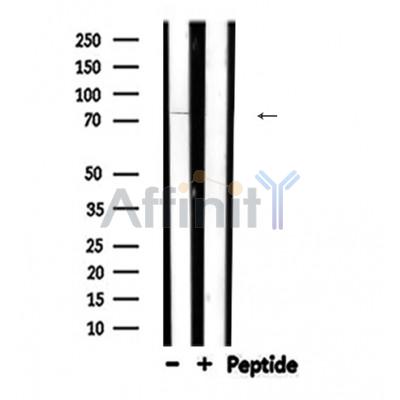ARHGEF7 Antibody - #DF6247
| Product: | ARHGEF7 Antibody |
| Catalog: | DF6247 |
| Description: | Rabbit polyclonal antibody to ARHGEF7 |
| Application: | WB IHC |
| Reactivity: | Human, Mouse, Rat |
| Prediction: | Pig, Bovine, Horse, Sheep, Dog, Chicken, Xenopus |
| Mol.Wt.: | 90kDa; 90kD(Calculated). |
| Uniprot: | Q14155 |
| RRID: | AB_2838213 |
Product Info
*The optimal dilutions should be determined by the end user. For optimal experimental results, antibody reuse is not recommended.
*Tips:
WB: For western blot detection of denatured protein samples. IHC: For immunohistochemical detection of paraffin sections (IHC-p) or frozen sections (IHC-f) of tissue samples. IF/ICC: For immunofluorescence detection of cell samples. ELISA(peptide): For ELISA detection of antigenic peptide.
Cite Format: Affinity Biosciences Cat# DF6247, RRID:AB_2838213.
Fold/Unfold
ARHG7; ARHG7_HUMAN; ARHGEF 7; Arhgef7; Beta pix; Beta-Pix; betaPix; betaPix-b; betaPix-c; Cool; COOL-1; COOL1; DKFZp686C12170; DKFZp761K1021; KIAA0142; KIAA0412; mKIAA0142; Nbla10314; P50; P50BP; p85; P85COOL1; P85SPR; PAK interacting exchange factor beta; PAK-interacting exchange factor beta; PAK3; Pak3bp; PIX; PIXB; Rho guanine nucleotide exchange factor (GEF) 7; Rho guanine nucleotide exchange factor (GEF) 7b; Rho guanine nucleotide exchange factor (GEF7); Rho guanine nucleotide exchange factor 7; SH3 domain containing proline rich protein;
Immunogens
A synthesized peptide derived from human ARHGEF7, corresponding to a region within the internal amino acids.
- Q14155 ARHG7_HUMAN:
- Protein BLAST With
- NCBI/
- ExPASy/
- Uniprot
MNSAEQTVTWLITLGVLESPKKTISDPEGFLQASLKDGVVLCRLLERLLPGTIEKVYPEPRSESECLSNIREFLRGCGASLRLELLFPPSQPPQHLVTTILLSASTFDANDLYQGQNFNKVLSSLVTLNKVTADIGLGSDSVCARPSSHRIKSFDSLGSQSLHTRTSKLFQGQYRSLDMTDNSNNQLVVRAKFNFQQTNEDELSFSKGDVIHVTRVEEGGWWEGTLNGRTGWFPSNYVREVKASEKPVSPKSGTLKSPPKGFDTTAINKSYYNVVLQNILETENEYSKELQTVLSTYLRPLQTSEKLSSANISYLMGNLEEICSFQQMLVQSLEECTKLPEAQQRVGGCFLNLMPQMKTLYLTYCANHPSAVNVLTEHSEELGEFMETKGASSPGILVLTTGLSKPFMRLDKYPTLLKELERHMEDYHTDRQDIQKSMAAFKNLSAQCQEVRKRKELELQILTEAIRNWEGDDIKTLGNVTYMSQVLIQCAGSEEKNERYLLLFPNVLLMLSASPRMSGFIYQGKLPTTGMTITKLEDSENHRNAFEISGSMIERILVSCNNQQDLQEWVEHLQKQTKVTSVGNPTIKPHSVPSHTLPSHPVTPSSKHADSKPAPLTPAYHTLPHPSHHGTPHTTINWGPLEPPKTPKPWSLSCLRPAPPLRPSAALCYKEDLSKSPKTMKKLLPKRKPERKPSDEEFASRKSTAALEEDAQILKVIEAYCTSAKTRQTLNSTWQGTDLMHNHVLADDDQPSLDSLGRRSSLSRLEPSDLSEDSDYDSIWTAHSYRMGSTSRKSCCSYISHQN
Predictions
Score>80(red) has high confidence and is suggested to be used for WB detection. *The prediction model is mainly based on the alignment of immunogen sequences, the results are for reference only, not as the basis of quality assurance.
High(score>80) Medium(80>score>50) Low(score<50) No confidence
Research Backgrounds
Acts as a RAC1 guanine nucleotide exchange factor (GEF) and can induce membrane ruffling. Functions in cell migration, attachment and cell spreading. Promotes targeting of RAC1 to focal adhesions (By similarity). May function as a positive regulator of apoptosis. Downstream of NMDA receptors and CaMKK-CaMK1 signaling cascade, promotes the formation of spines and synapses in hippocampal neurons.
Phosphorylated by PTK2/FAK1; this promotes interaction with RAC1 (By similarity). Phosphorylated on Ser-694 by CaMK1; enhancement of GEF activity and downstream activation of RAC1.
Cell junction>Focal adhesion. Cell projection>Ruffle. Cytoplasm>Cell cortex. Cell projection>Lamellipodium.
Note: Detected at cell adhesions. A small proportion is detected at focal adhesions.
Research Fields
· Cellular Processes > Cell motility > Regulation of actin cytoskeleton. (View pathway)
Restrictive clause
Affinity Biosciences tests all products strictly. Citations are provided as a resource for additional applications that have not been validated by Affinity Biosciences. Please choose the appropriate format for each application and consult Materials and Methods sections for additional details about the use of any product in these publications.
For Research Use Only.
Not for use in diagnostic or therapeutic procedures. Not for resale. Not for distribution without written consent. Affinity Biosciences will not be held responsible for patent infringement or other violations that may occur with the use of our products. Affinity Biosciences, Affinity Biosciences Logo and all other trademarks are the property of Affinity Biosciences LTD.
